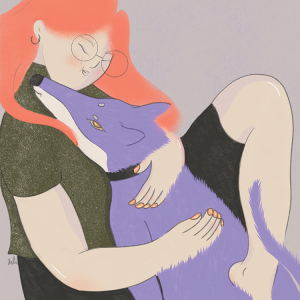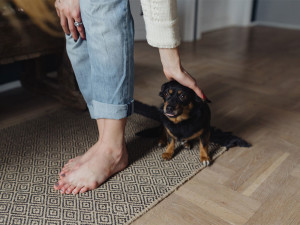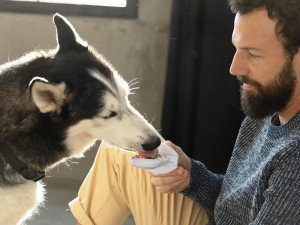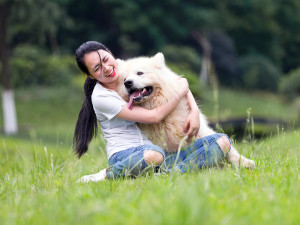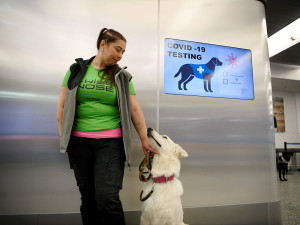Yes, Your Stress Is Making Your Dog Stressed, New Study Finds
It might be time to take a deep breath for both of your sake.

Share Article
We know: Life is stressful. You’re reminded of that fact pretty much every time you step outside, scroll through social media, or click open a news notification. But if there’s any motivation for cutting down on doomscrolling and taking time for a little self-care, it’s this: Our dogs are picking up on our stress — and it’s making them anxious. In a study published in Octoberopens in new tab, researchers at Queen’s University Belfast looked at how pups and humans react to stress and found that when pet parents’ heart rates increase, our pets’ do, too.
How the study worked
For the study, the researchers fitted 28 dog parents and their dogs with heart rate monitors. Half of the pet parents were then given a digital test meant to induce stress. The other half were given a guided meditation, which included breathing exercises and affirmations, such as “My dog brings me joy.”
After the digital test, pet parents’ heart rates had increased. Following the guided meditation, their heart rates had decreased. In both cases, the change in the pet parents’ heart rates impacted their pets. “Changes in owner HR significantly predicted changes in the HR of their dogs, suggesting that dogs exhibit emotional contagion and social referencing towards their owners in novel situations,” Aoife Byrne, the study’s lead author, wrote. “Acute changes in owner stress levels can produce rapid changes in canine physiological stress parameters.”
Interestingly, the researchers also found that overall, the dogs’ heart rates decreased over time. “This emphasizes the importance of allowing dogs to acclimatize to novel environments,” Byrne wrote.

Researchers hope that these findings can help make stressful situations, including veterinary visits, less upsetting for dogs. “By devising strategies to mitigate owner stress in veterinary settings, canine stress may, as a result of reducing owner stress, also be alleviated,” Byrne wrote.
Anxiety, pet parents, and dogs
The results support previous research that anxious pet parents raise more anxious pups. One 1997 paperopens in new tab found that the personalities of pet parents with “aggressive” dogs tended to be more tense than the pet parents of dogs without a history of aggression. Another study published in 2018opens in new tab found that pet parents who scored low on the “emotional stability” trait — one of the Big Five personality traits — were more likely to have dogs with behavioral issues. “Dogs belonging to high stress/anxiety clients are often higher than average in their stress levels and exhibit more anxiety or hyperarousal,” Kim Brophey, author of opens in new tab Meet Your Dog: The Game-Changing Guide to Understanding Your Dog’s Behavior, told Kinship.opens in new tab
In other words, whether you’re training your pup, taking them to their annual vet visit, or just spending some quality time together, keep in mind that your attitude may be contagious. A couple of deep breaths and positive affirmations might be the best thing for both of you. And hey, splurge on that spa day, while you’re at it. What’s good for you is good for your pup — it’s science.

Sio Hornbuckle
Sio Hornbuckle is the Assistant Editor at Kinship, where they frequently write for the site. As a writer, they specialize in pet news, animal science, and pop culture. They live in New York City with their cat, Toni Collette.
Related articles
![Woman hugging her dog outside.]()
4 Things You’re Doing That Really Stress Your Dog Out
Some may come as a surprise.
![Illustration of a woman hugging a dog]()
Your Dog Can Smell When You’re Stressed, New Study Says
Research finds that your pup can smell when you’ve been doom-scrolling, and they get bummed out.
![woman petting small dog that is feeling stressed]()
Stressed Pets: How to Keep Your Dogs Relaxed When Leaving Them Alone
Tips on helping a dog deal with their daily stress.
![A bearded man in a gray sweater and yellow pants sitting on the floor and holding a Groov Training Aid in "lilac" from Diggs Pet, which is like a grooved plastic popsicle with treats smeared in, while his Husky dog licks it]()
9 Stress Toys For Dogs That Are Cheaper Than Therapy
The toys that’ll help your pup chill out after a long day of being a dog.
![Woman and her large white dog sit in grass outside.]()
Playing with Dogs Reduces Stress and Increases Concentration, New Study Finds
Having trouble chilling out or focusing? Maybe it’s time to get a dog.
![Woman wearing a neon green t-shirt, black pants, and a grey vest gesturing to a white dog on a leash while standing in front of a sign on a metal wall that reads "COVID-19 Testing"]()
COVID-19 Isn’t Going Anywhere. Enter Dogs Who Can Sniff It Out
The answer to every (seemingly never-ending) crisis: Dogs.


